Key takeaways:
- Nature serves as a rich educational resource, offering lessons on resilience, adaptability, and the interconnectedness of ecosystems.
- Learning in outdoor environments enhances focus, creativity, and mental well-being, making it a valuable complement to traditional education.
- Engaging in outdoor activities fosters curiosity and allows for hands-on experience, deepening understanding and appreciation of natural processes.
- Creating nature-based curricula and reflecting on nature experiences can ignite student curiosity and facilitate profound personal insights.
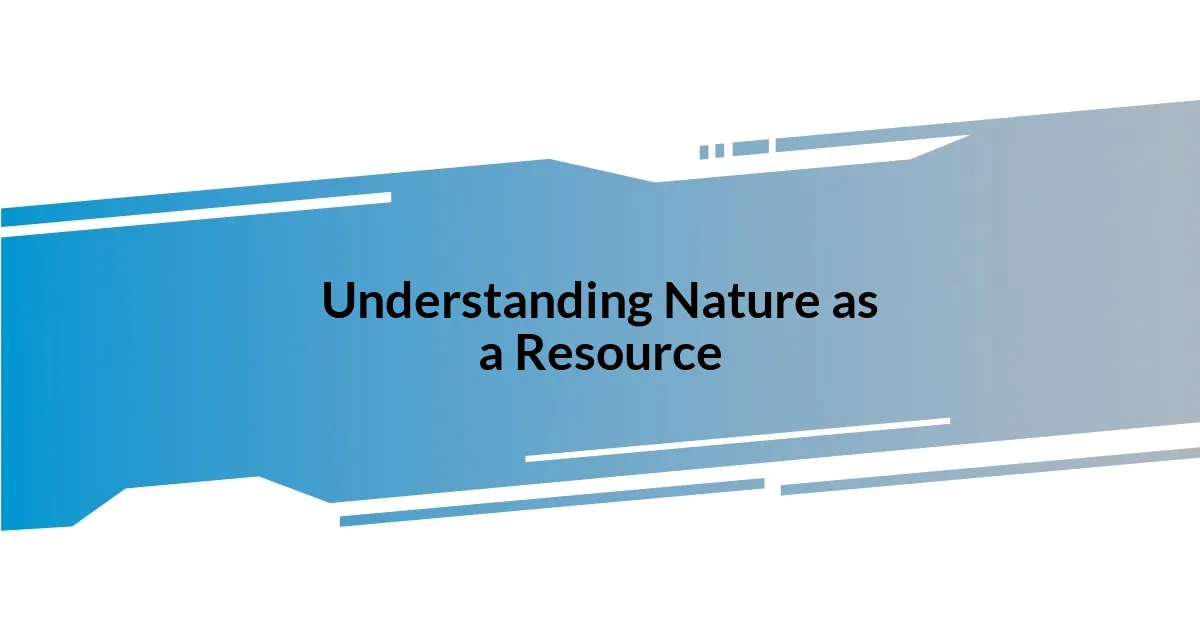
Understanding Nature as a Resource
Nature is truly a treasure trove of resources, offering so much more than just beautiful scenery. When I think back to my childhood, I remember setting out on long hikes, collecting leaves and rocks. Each find sparked curiosity about ecosystems, geology, and the delicate balance of life around us. Have you ever wondered how much wisdom is hidden in a single tree or the soil beneath your feet?
As I ventured into the woods, I noticed how each season presents a unique lesson. The vibrant colors of autumn leaves taught me about change and resilience, while the stillness of winter sparked reflections on rest and renewal. Can you remember a moment in nature that reshaped your understanding of life? For me, it was during a thunderstorm, feeling both fear and awe. I realized that nature not only teaches us about survival but also compels us to respect its power.
Every aspect of nature provides a learning opportunity, whether it’s observing wildlife or studying plant growth. I often find myself pausing to watch a group of ants working tirelessly together, which reminds me of teamwork and community. It’s fascinating to think that we can draw parallels between these natural phenomena and our everyday lives. Have these insights ever left you pondering deeper questions about your own connections with others? Nature’s resources aren’t just physical; they can transform our way of thinking and being.
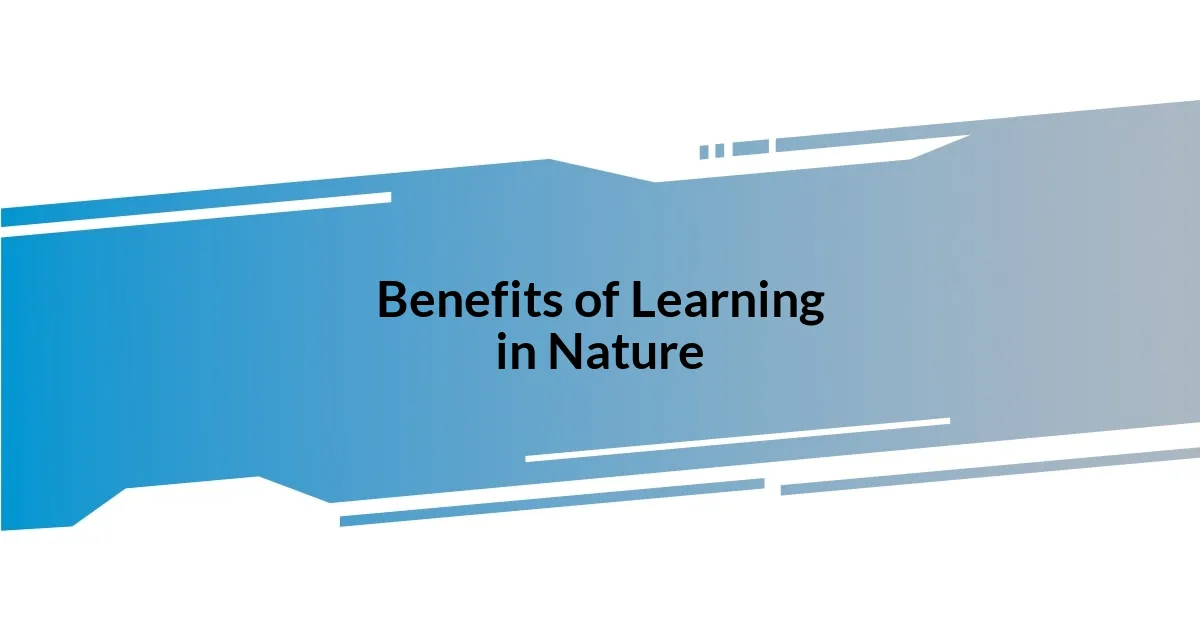
Benefits of Learning in Nature
Learning in nature offers a multitude of benefits that extend far beyond the classroom experience. I vividly recall an afternoon spent by the lake, where I watched dragonflies dance over the water. This wasn’t just play; it became a lesson in biology, as I marveled at their intricate wings and agile movements. The peace of the natural world allowed my mind to absorb information in a way that felt expansive and freeing—much different from the confines of four walls.
The beauty of nature as an educational environment is profound. It encourages curiosity, fosters creativity, and enhances well-being. Here are some key benefits:
- Enhanced Focus: The calmness of nature helps reduce distractions, allowing for deeper concentration.
- Increased Creativity: Natural settings inspire innovative thinking, making it easier to brainstorm and solve problems.
- Improved Mental Health: Being outdoors lowers stress levels and boosts mood, which can make learning more enjoyable.
- Real-world Connections: Observing wildlife and ecosystems creates tangible links to theoretical concepts, enhancing understanding.
- Physical Activity: Engaging in nature typically involves movement, promoting both physical and mental fitness.
Reflecting on these experiences, I often feel a surge of gratitude for the lessons learned in the great outdoors. It’s remarkable how much wisdom can be tucked away in the rustling leaves or the sound of a flowing stream. Do you think the world outside holds answers to questions perhaps we never even thought to ask?
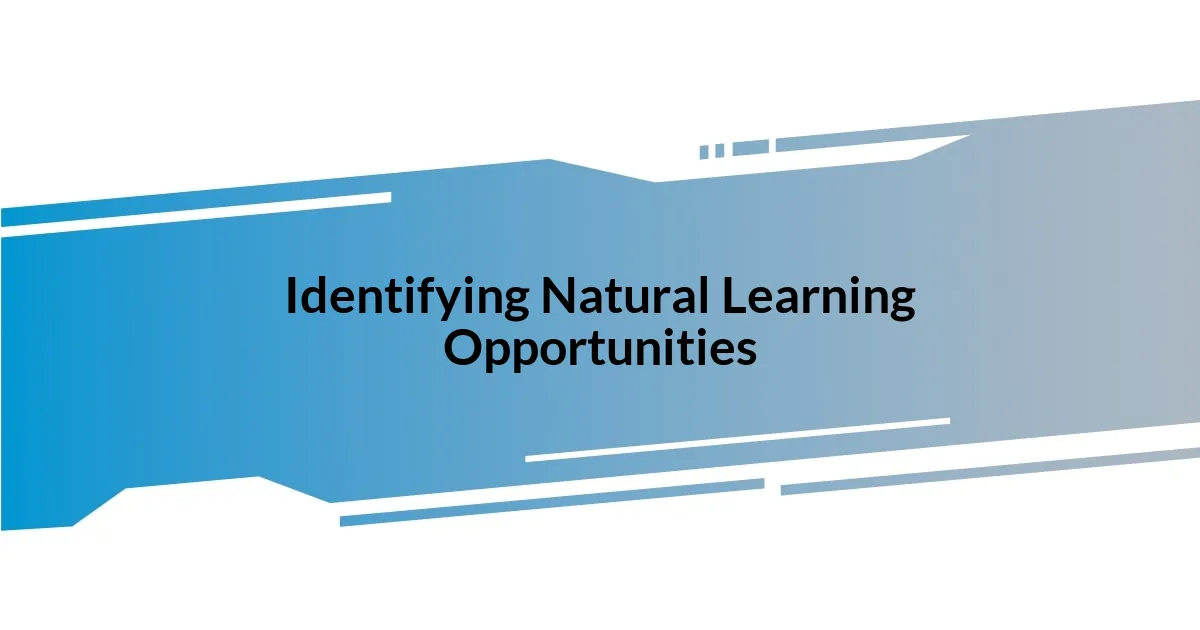
Identifying Natural Learning Opportunities
Identifying natural learning opportunities requires keen observation and an open mind. I remember a day when I was hiking through a forest and noticed how the patterns in tree bark ranged from smooth to deeply ridged. This simple observation led to questions about how these variations adapt to their environment. Such moments emphasize that nature continually provides lessons if we take the time to truly look. Have you ever stopped to study a tiny detail in nature, and felt that spark of curiosity ignite something new within you?
It’s not just about the big picture; sometimes, it’s the minute details that offer the richest insights. One day, I found myself captivated by how a small flower grew through a crack in the pavement. Watching that little bloom thrive in a seemingly harsh environment reminded me of resilience and adaptability in life. To me, nature often mirrors our own challenges; don’t you think? The more I reflect on these experiences, the more I realize that every outdoor moment holds potential for learning, waiting to be uncovered.
As I hike or simply spend time outside, I keep a mental note of what catches my attention. It could be an unusual rock formation or even the way a stream flows. Engaging with these elements often leads me to explore larger concepts—like geological processes or the water cycle. When you immerse yourself in nature, what catches your eye? I find that by simply being present and curious, I can unlock a treasure trove of learning opportunities that deepen my appreciation for the world around me.
| Natural Indicator | Learning Opportunity |
|---|---|
| Tree Bark Patterns | Adaptation and Survival |
| Flowers Growing in Cracks | Resilience and Overcoming Obstacles |
| Rock Formations | Geological Processes |
| Stream Flow | Water Cycle and Ecosystems |
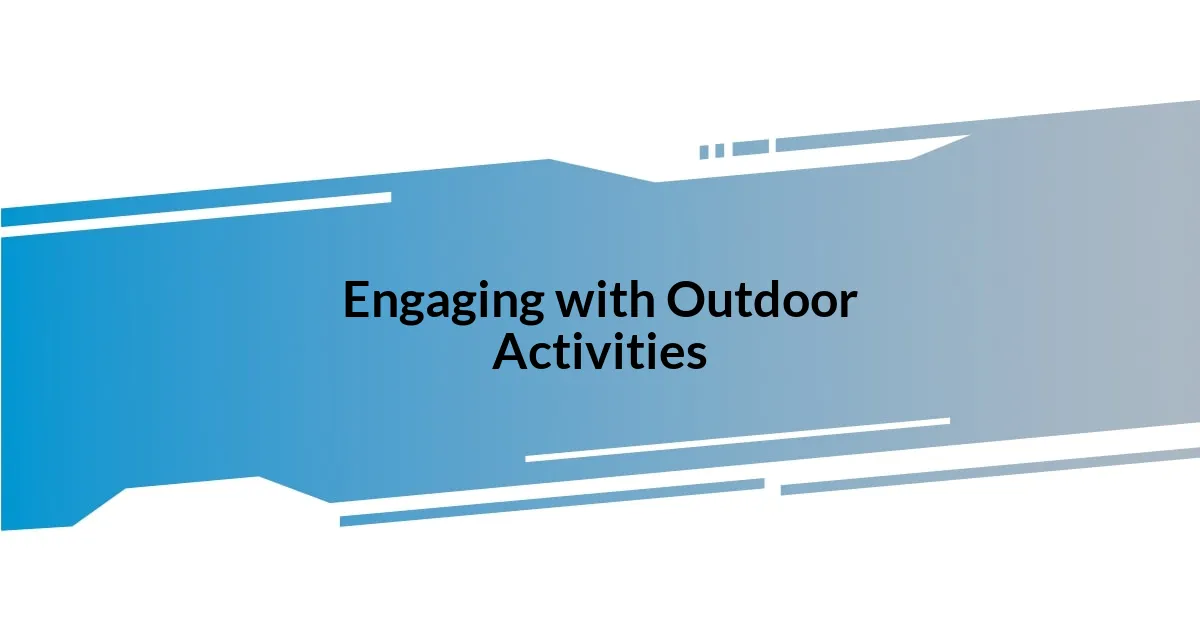
Engaging with Outdoor Activities
Engaging in outdoor activities opens up a world of learning I never imagined possible. The last time I went rock climbing, I was not only challenged physically but also captivated by the geology around me. As I studied the layers of stone beneath my hands, I felt a connection to millions of years of history. Isn’t it fascinating how climbing a rock face can simultaneously teach you about Earth’s formation and push your limits?
During a weekend camping trip, I stumbled upon a bird’s nest nestled in the branches of a nearby tree. Watching the parent birds feed their chicks stirred a sense of wonder within me. It was a vivid reminder of the cycles of life and the role each creature plays in our ecosystem. How often do we reflect on our connections with nature and what they can teach us about ourselves and our environment?
Being outdoors especially invigorates my curiosity, whether I’m exploring a forest or wandering along a beach. I often collect fallen leaves or interesting stones, letting them spark questions about their origins. Why are some leaves more vibrant than others? What stories do these stones hold? Each little expedition becomes a quest for knowledge, and I can’t help but wonder—what will you discover on your next adventure?
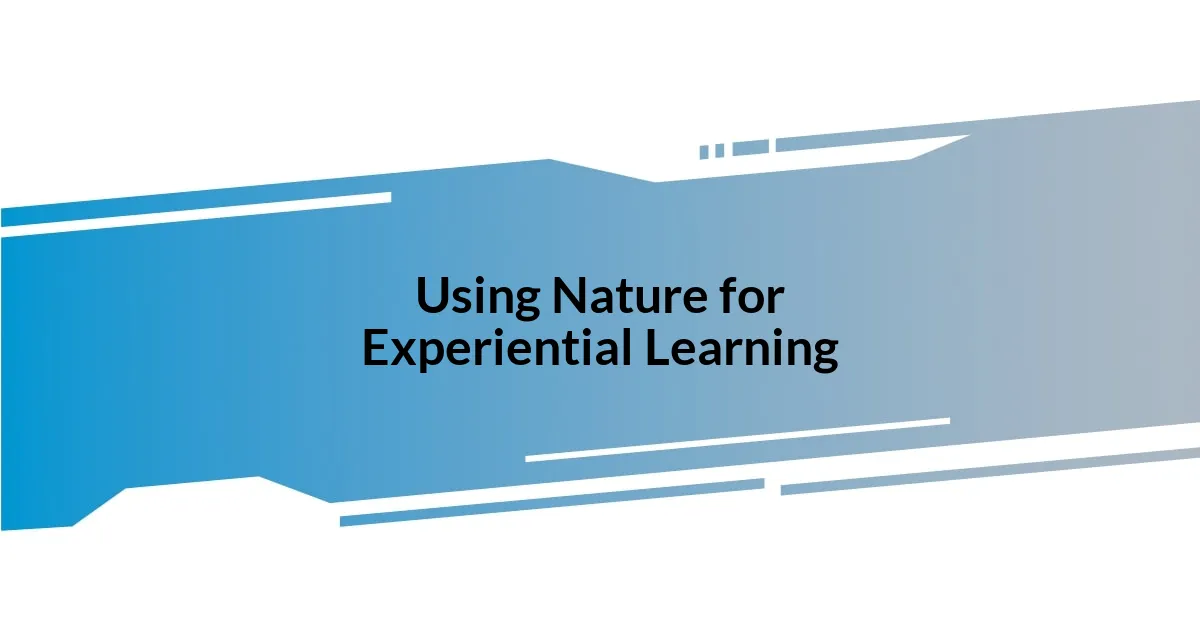
Using Nature for Experiential Learning
Engaging with nature not only provides rich experiences but also serves as a classroom without walls. I recall a time when I stumbled upon a tide pool during a beach walk; my curiosity was piqued as I observed the colorful creatures clinging to rocks. This small ecosystem was alive with interactions, prompting me to dive deeper, not just into marine biology but also into the delicate balance of coastal environments. Isn’t it amazing how a single glance can open up a world of learning?
I also cherish moments when I gather with friends for a nature walk, armed with our sketchbooks. One day, I decided to draw the intricate structure of a spider’s web glistening with morning dew. Through this creative process, I appreciated not just the beauty but also the engineering marvel of a spider’s creation. It got me thinking—how often do we overlook the intersections of art and science that nature showcases so beautifully?
The seasons provide a rhythmic learning experience as well. I remember planting a small vegetable garden last spring, where I not only learned about growth cycles but also felt an emotional connection to nurturing life. Watching those tiny seeds transform into healthy plants was a reminder that patience and care yield rewarding results. What can your own garden teach you about growth, resilience, and perhaps even your own life journey?
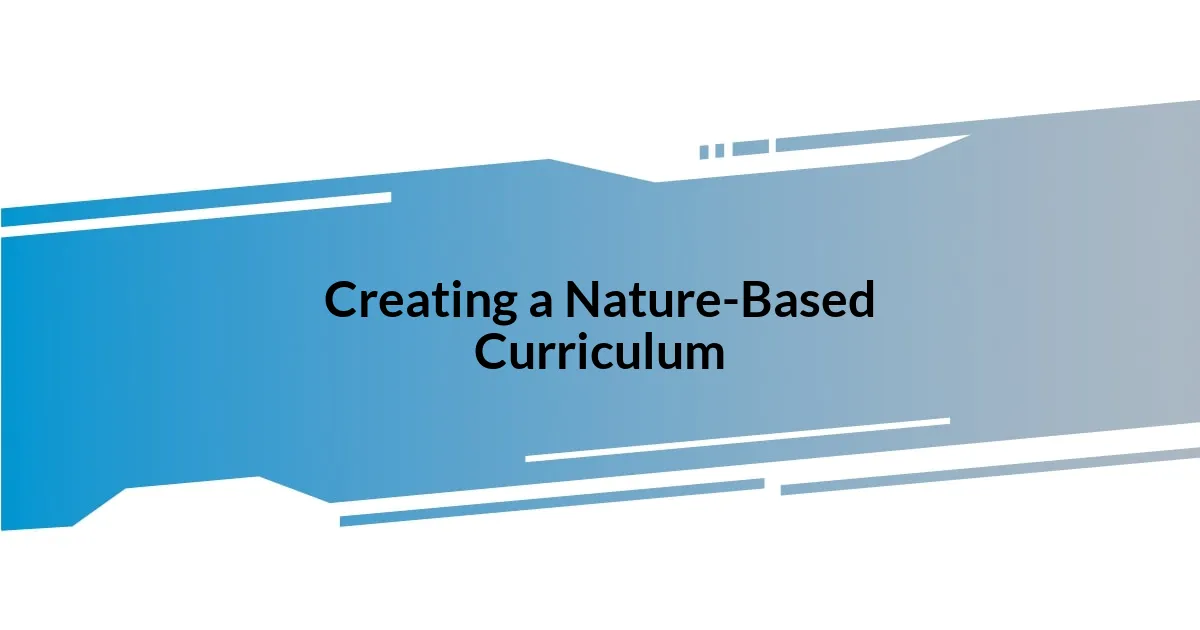
Creating a Nature-Based Curriculum
Creating a nature-based curriculum is an inspiring challenge that I find incredibly rewarding. In my experience, integrating elements of the natural world into lesson plans ignites a spark of curiosity in students. For example, during a project about ecosystems, I took my class on a nature trail. They were fascinated to see the different habitats up close, connecting theory with their real-world observations. Doesn’t it feel empowering to witness that lightbulb moment when knowledge clicks?
I’ve discovered that hands-on activities are pivotal when crafting activities around nature. Last year, I organized a scavenger hunt where students gathered various leaves and flowers. As they closely examined the details of each specimen, I saw their enthusiasm flourish. This not only fostered a love for botany but also helped them develop skills in observation and critical thinking. Isn’t it incredible how something so simple can plant seeds of knowledge?
To tie it all together, I emphasize reflections after these outdoor experiences. At the end of our hiking adventures, I encourage students to share their thoughts on what they’ve learned or felt. This practice often reveals their deep emotional connections to nature—something they might not articulate otherwise. I always ask, “How did this experience change your perspective?” The responses can be profound, revealing not just what they learned about the environment, but also about themselves. What reflections might your students share in similar moments?
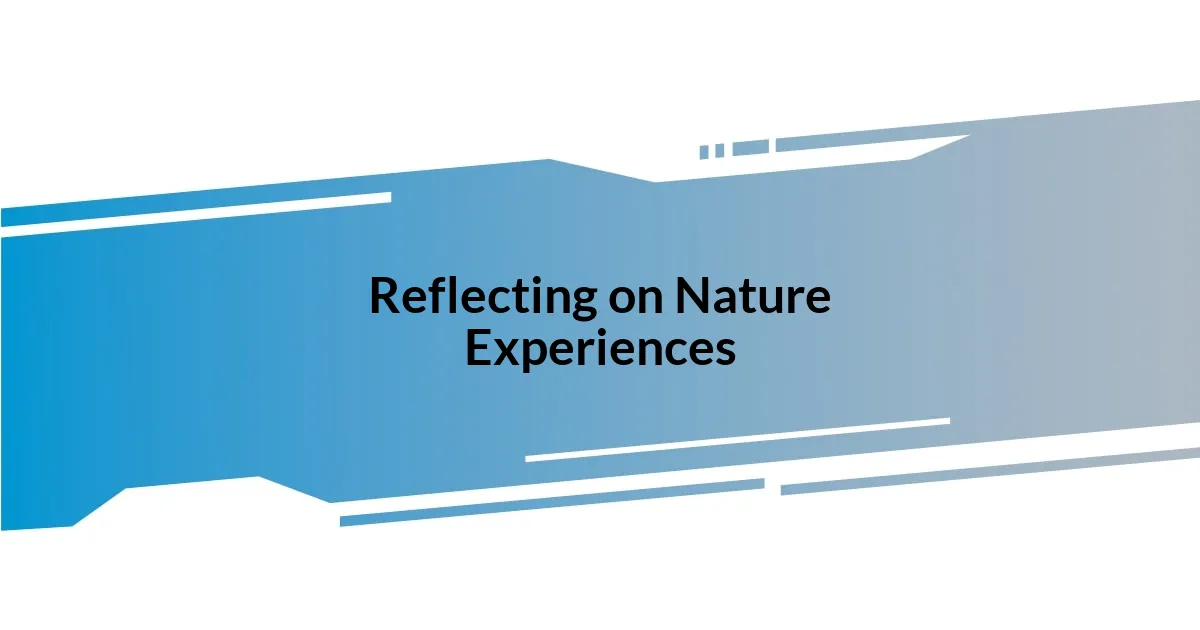
Reflecting on Nature Experiences
Reflecting on nature experiences always brings back vivid memories for me. I recall one particular hike where I sat beneath an old oak tree, its branches stretched wide like welcoming arms. As I listened to the rustle of leaves and the whispers of the breeze, I felt a profound sense of peace wash over me. This moment made me realize how powerful nature can be in grounding us and sparking introspection. Have you ever had an experience like that, where nature just seems to embrace you?
I often find that the stillness of a forest or the rhythmic sound of waves can lead to deep self-reflection. There’s something about being surrounded by trees that invites contemplative thoughts. During a solo camping trip, I spent hours just watching the sunset. The colors painted across the sky felt like a gentle reminder of the beauty in change. In that quiet moment, I pondered my own transitions in life. How often do we take the time to reflect on our journeys while immersed in nature’s wonders?
Sometimes, the lessons nature offers aren’t just about tranquility; they can be stark reminders, too. I remember hiking through a section of forest that had been damaged by a recent fire. The charred remains of trees stood alongside new sprouts fighting to thrive. This juxtaposition struck me deeply. It was a powerful metaphor for resilience and recovery, both in nature and in our lives. What can we learn from these restorative processes? Nature teaches us that growth often emerges from adversity, and that stays with me long after the hike ends.